|
|
|
Sort Order |
|
|
|
Items / Page
|
|
|
|
|
|
|
| Srl | Item |
| 1 |
ID:
106499
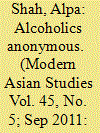

|
|
|
|
|
| Publication |
2011.
|
| Summary/Abstract |
From millenarian movements to the spread of Hindu rightwing militancy, attacks on adivasi (or tribal) consumption of alcohol have gone hand-in-hand with the project of 'civilizing the savage'. Emphasizing the agency and consciousness of adivasi political mobilization, subaltern studies scholarship has historically depicted adivasis as embracing and propelling these reformist measures, marking them as a challenge to the social structure. This paper examines these claims through an analysis of the relationship between alcohol and the spread of the Maoist insurgency in Jharkhand, Eastern India. Similar to other movements of adivasi political mobilization, an anti-drinking campaign is part of the Maoist spread in adivasi areas. This paper makes an argument for focusing on the internal diversity of adivasi political mobilization-in particular intergenerational and gender conflicts-emphasizing the differentiated social meanings of alcohol consumption (and thus of prohibition), as well as the very different attitudes taken by adivasis towards the Maoist campaign. The paper thus questions the binaries of 'sanskritisation' versus adivasis assertion that are prevalent in subaltern studies scholarship, proposing an engagement with adivasi internal politics that could reveal how adivasi political mobilization contains the penetrations of dominant sanskritic values, limitations to those penetrations and other aspirations, such as the desire for particular notions of modernity.
|
|
|
|
|
|
|
|
|
|
|
|
|
|
|
|
| 2 |
ID:
106506
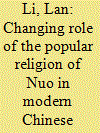

|
|
|
|
|
| Publication |
2011.
|
| Summary/Abstract |
Since the early 1980s, China's rapid economic growth and profound social transformation have greatly changed the role of popular religion in modern Chinese politics. In the case of nuo, these changes have been directly responsible for the incorporation of this popular religion into the implementation of Party-state's policy on ethnic minority and the provision of evidence to support the legitimacy of the Chinese Communist Party's regime. Through manipulation and reinterpretation by local governments, the popular religion of nuo has not only become the target of local socio-economic development, a common phenomenon in contemporary China, but has also played a key role in ethnic identification, which is an important step for a post-Mao's CCP to maintain political stability in ethnic minority areas. In addition, nuo has through the research of Marxism-influenced schools fundamentally altered its position from an officially unrecognized religion opposed to both socialist political order and atheist ideology to a politically favoured 'living fossil' of primitive culture. This proves the Marxist evolutionary theory in which socialism and communism are thought to be inescapable consequences of social development. The positive role played by nuo in modern Chinese politics has brought the popular religion much open support and endorsement from party-state officials at all levels, including top-ranking officials within the Central Committee of the CCP. Like any popular religion, nuo has over the centuries undergone significant changes, but never before has it experienced such dramatic changes in its relationship with an anti-religious and pragmatic central government, something which has significantly altered the course of its development.
|
|
|
|
|
|
|
|
|
|
|
|
|
|
|
|
| 3 |
ID:
106497
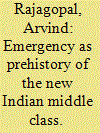

|
|
|
|
|
| Publication |
2011.
|
| Summary/Abstract |
Recent accounts of the National Emergency of 1975-1977 concur that the deviations it represented, while genuine, did not represent any fundamental change on the part of the Indian state, and that the period offers little distinct insight on the post-independence period as a whole. This paper seeks to argue, to the contrary, that the Emergency was a watershed in post-independence history. With its ban on dissent and suspension of constitutional rights, the Emergency sought to suppress all political disturbances to governance. By doing so, it forefronted the problems of postcolonial politics in at least three respects. First, the Emergency demonstrated that coercion was inextricably combined with consent in state-led development. Second, this led to a heavy reliance on practices of communication to redefine coercion and to stage popular consent. Third, in the process, the boundaries of the political were reinforced, emphasizing the friend/enemy difference fundamental to politics. Governance in the aftermath of the Emergency placed an overt reliance on consent over coercion, but in ways that are themselves significant. Categories of culture and community, and related forms of social distinction, gained in importance over earlier developmental distinctions premised on an authoritarian relationship between state and the people. The change meant a shift away from the Nehruvian focus on the economy as the crucial arena of nation-building, involving labour as the key modality of citizenship. Instead, culture and community became the categories that gained political salience in the period of economic liberalization. The mass media were central to this redefinition of the political, multiplying in size and reach, and acquiring market-sensitive forms of address couched in the rhetoric of individual choice. These events, I suggest, are critical to understanding the formation of the new middle class in India, as a category that increasingly defines itself through cultural and consumerist forms of identity, and is less identified with the state.
|
|
|
|
|
|
|
|
|
|
|
|
|
|
|
|
| 4 |
ID:
106498
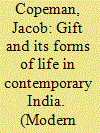

|
|
|
| 5 |
ID:
106504
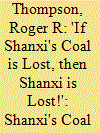

|
|
|
|
|
| Publication |
2011.
|
| Summary/Abstract |
The land-locked north China province of Shanxi, identified in 1870 by the geologist Baron Richthofen as 'one of the most remarkable coal and iron regions in the world', was the site of a provincially-defined national movement far removed from the better-studied treaty ports and their articulate and prolific nationalists. This late-Qing provincialism may be read as a mediating symbol of an emerging national consciousness.
Social tensions were exacerbated by external challenges brought by foreign agents, and their Chinese collaborators, of cultural and economic imperialism. Opposition to missionaries and Chinese Christians had begun as early as the 1860s. In 1898 the British Pekin Syndicate and its extra-provincial Chinese associates, with the backing of the central government, secured rights to Shanxi's rich coal and iron resources. These rights were ceded back ten years later after a successful 'rights-recovery' movement that possesses similarities to (but also significant differences from) the well-studied oppositional movements in Jiangsu, Zhejiang, Hunan, and Shandong in the period 1905-1911. The duration of Shanxi's struggle, along with its extra-bureaucratic elite activism, popular mobilization, and cooperation with Beijing, makes its rights-recovery movement distinctive. The rhetoric and practices of the movement, which began before the Boxer Uprising of 1900 and reflects the rhetorical influence of these earlier protests, contributed to a strong regional solidarity that was backed by central state authority. There were various patterns of protest, one indigenous and provincial, one extra-provincial and nationalist, that interacted in the period 1902-1908. Provincial activists, including merchants, peasants, students, degree-holders, and officials, insisted that Shanxi's coal was for the use of the community, the province, and the nation on terms established by and for the people of Shanxi. In their victory, localism, provincialism, and the national project, had come together.
|
|
|
|
|
|
|
|
|
|
|
|
|
|
|
|
| 6 |
ID:
106510
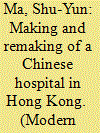

|
|
|
|
|
| Publication |
2011.
|
| Summary/Abstract |
Hong Kong's hospital system has long been the territory of Western medicine. However, during the Severe Acute Respiratory Syndrome (SARS) outbreak in 2003, an integrative approach, combining Chinese and Western medicines, was used in some hospitals in Hong Kong, suggesting a revival of Chinese medicine in the hospital system of this former British colony. This paper will explain how this could happen, by situating the event in the over 160 years' long history of Chinese medicine in Hong Kong. Specifically, it will focus on the role of 'Chinese medicine' and 'traditional Chinese medicine' in Tung Wah Hospital, a local charity established in 1870, which grew subsequently into one of the largest voluntary organizations in Hong Kong. It will also show how the fall and revival of Chinese medicine in this hospital were related to two epidemics: the bubonic plague in 1894, and the SARS outbreak in 2003.
|
|
|
|
|
|
|
|
|
|
|
|
|
|
|
|
| 7 |
ID:
106502
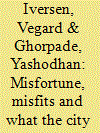

|
|
|
| 8 |
ID:
106501
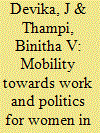

|
|
|
|
|
| Publication |
2011.
|
| Summary/Abstract |
In this paper, historical analysis and qualitative fieldwork are combined to question the belief that recent efforts in Kerala to induct women into local governance and mobilize poor women into self-help groups implies continuity with the earlier history of women's mobility into the spaces of paid work and politics. For a longer view, the histories of gender-coding of spaces and of women's mobility into paid work and politics are examined. In the twentieth century, while the subversive potential of paid work was contained through casting it within 'feminine terms', politics was unquestionably 'unfeminine space'. However, recent efforts have not advanced women's mobility in any simple sense. The subversive potential of women's mobility towards work in self-help groups is still limited. In local governance, unlike the experience of an earlier generation of women, the ability to conform to norms of elite femininity now appears to be a valuable resource.
|
|
|
|
|
|
|
|
|
|
|
|
|
|
|
|
| 9 |
ID:
106503
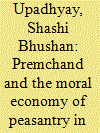

|
|
|
| 10 |
ID:
106500


|
|
|
|
|
| Publication |
2011.
|
| Summary/Abstract |
This paper examines female education, marriage and honour among upwardly mobile Dalits. Using data collected during fifteen months of ethnographic fieldwork (2004-2005) in a Dalit community in rural Andhra Pradesh, I describe how families who constitute the upper strata of Dalits are educating their daughters in order to marry them 'upwards' within their caste to a groom with prospects of employment. Education allows these Dalit girls to become housewives, escaping a life of demeaning agricultural labour, colloquially: 'hard work in the hot sun'. But as educated wives they must have middle-class virtues to match. Unlike their labouring counterparts, their language, dress, movement and manners must convey shame and modesty. As their responsibility for maintaining family honour increases, they are progressively more scrutinised and controlled. I explore this heightened emphasis on honour among traditionally egalitarian Dalits and suggest reasons for the increasing concern about female sexuality. Education for girls is seen as a particularly risky business: on the one hand it provides opportunities for sexual encounters, but on the other hand it holds the promise of hypergamy. Given their already precarious circumstances, many Dalits choose to cut short the education of their daughters, rather than take the risk.
|
|
|
|
|
|
|
|
|
|
|
|
|
|
|
|
|
|
|
|
|